You are what you eat. In today’s world it’s shocking to learn that, according to the World Health Organisation, as many people suffer from obesity as from hunger. What these contrasting forms of ‘malnutrition’ often have in common is people’s limited access to wholesome, nutritious food.
Steve Collins has spent decades as a medical doctor dealing with malnutrition among famine-afflicted communities in African and India. Today, he farms 140 acres of bucolic ‘mountainy land’ in west Cork which, while it may seem unlikely, merely reflects a new chapter in Steve’s mission in life: growing, and helping other farmers to grow, nutrient-dense foods to improve public health.
The first impression on arriving, eventually, at Steve’s ‘Derry Duff’ farm is a disconcerting sense that a small chunk of Tuscany has somehow been relocated to this remote hillside.
The striking sight is a source of great pride to Steve: that, over two decades, he has painstakingly carved out, from this unpromising terrain, flourishing fields of blueberry and chokeberry (Aronia) bushes.
The blueberries are Steve’s main cash crop, sold in punnets in local shops and in huge demand, outcompeting imports. Harvested by hand, the (7,000) bushes this year ultimately yielded up to 3,000kg per acre of highly nutritious fruit.
Steve started with 17 different blueberry varieties, observed over time those that best suited the local geography and climate, and steadily improved yield and profitability in the process.
Chokeberries
But it’s his Aronia berry enterprise that’s really exciting Steve just now. Initially drawn to their powerful polyphenol properties (great for cardiovascular and cognitive health), Steve has been growing this super-food on his thin soils for years, bottling the juice and selling it to health food stores, under his Phyterberry brand, at a premium price.
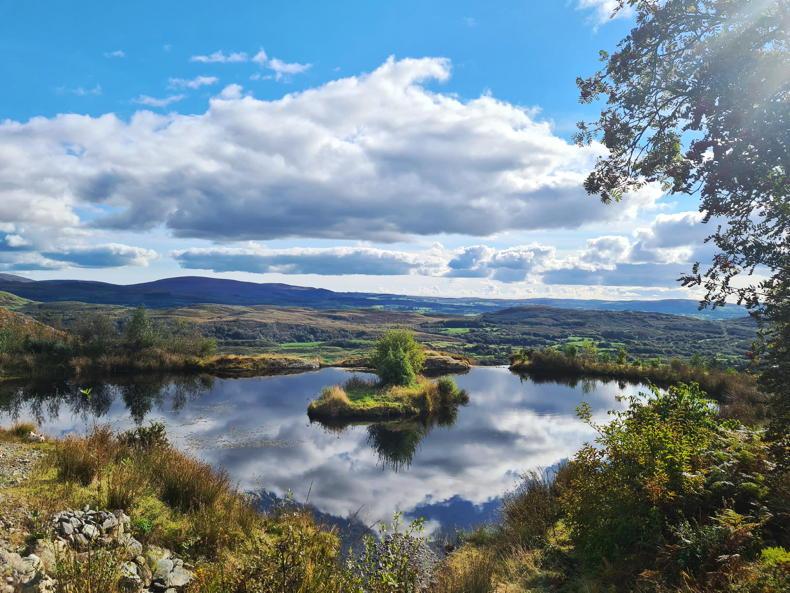
Just one of the magnificent ponds that Steve has created on his farm.
Most Aronia juice is currently imported from Poland, so having a homegrown alternative appeals to health-conscious consumers.
Steve’s vision is not to grow more berries and sell more Aronia juice, but to convince other upland farmers (the berries grow well on poor soils) to grow Aronia berries on contract, delivering economies of scale, which will make the business more economically sustainable.
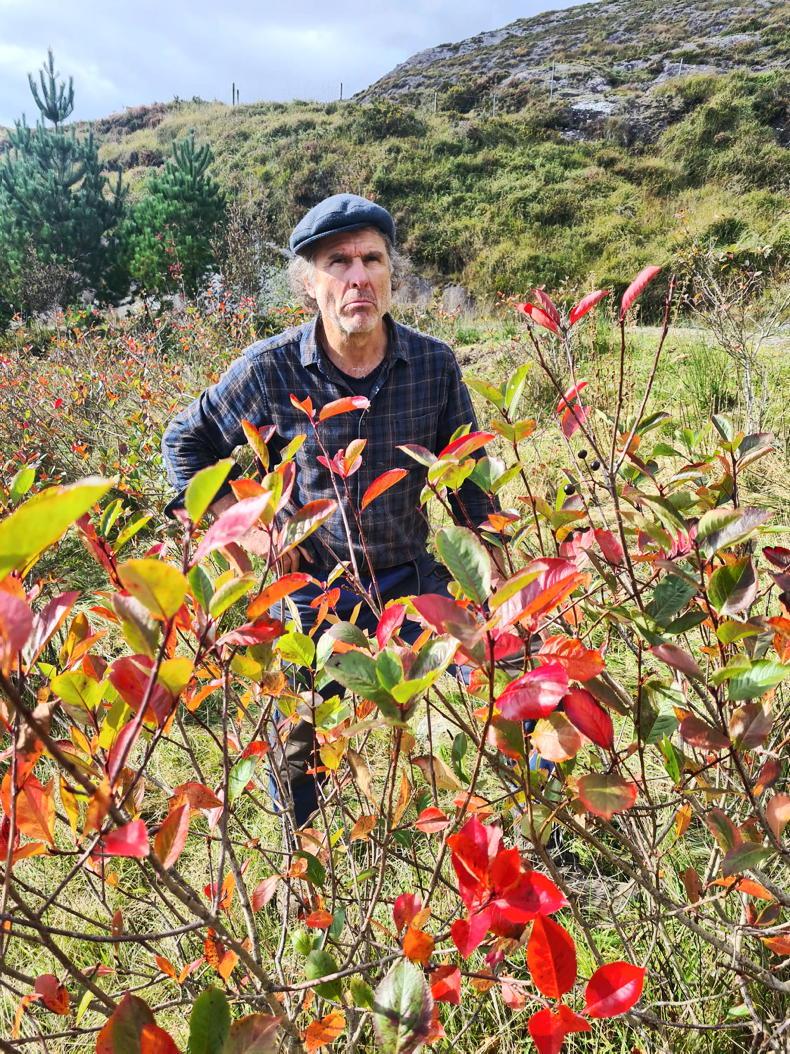
Steve with his Aronia bushes which he hopes other farmers will consider growing.
Steve is bullish about the potential value – up to €6,000/acre on poor land, he reckons – and Teagasc has come on board researching the Aronia-juicing residue, potentially adding further value to the enterprise.
Multi-enterprise
But it doesn’t end with berries for Steve, a serial entrepreneur.
His initial farming focus was rearing Dexter cattle and direct-selling the meat. He still has eight cattle but now most of the meat is consumed by guests at his wife Claire’s stunning on-farm Airbnb. The standalone building opens out to a beautiful pond, one of several which Steve has carved out of the landscape, adding further to the property’s scenic allure and habitat diversity.

Steve uses local fleeces mixed with wood chip to nurture his fruit bushes and trees.
The farm ponds double up as a farm water supply when needed (a 6m litre supply by his reckoning) and Steve also has plans for a mini hydro-power plant to generate electricity, as well as a solar array (hidden from view), further reducing farm costs and building resilience.
He also keeps some pigs, not least for their ability to break up the ground and allow trees to grow. He has any number and variety of trees on the farm, many grown from cuttings, providing a valuable source of fuel and, in some cases, fruit. Even the farm’s heathy, Dexter-grazed grasslands score well under ACRES, earning premium payments.
Larger-than-life character
As farmers’ journeys go, Steve’s is remarkable. He ‘found’ this semi-abandoned farm in 2004 – or maybe it’s a case that it ‘found’ him – and since then he has worked tirelessly to realise his dreams of unlocking a sustainable livelihood for his family from this unlikely spot. Steve and Claire’s three teenage children all help out on the farm – caring for the cattle, pigs and poultry.
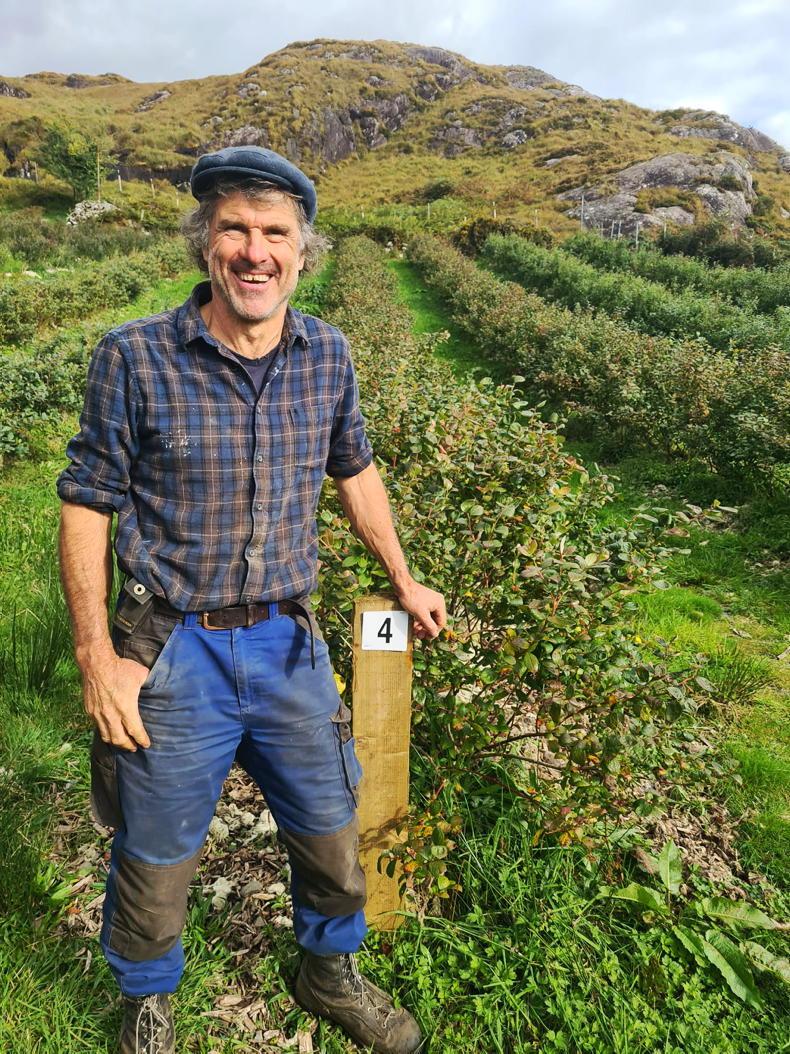
Steve with some of his blueberry bushes, soon after harvesting.
A larger-than-life character, Steve’s farming enterprise also seems larger than its 140 acres, such is the level of innovation and diversity on show. Steve loves farming, and has really painted his own canvas on this west Cork hillside.
A man on several simultaneous missions, his many micro-enterprises are building diversity and resilience, potentially benefiting other upland farmers and supporting healthier diets, making this a truly ‘nourishing’ farm enterprise on so many levels.
Steve set up a company, Aronia Health Science, and the PhyterBerry brand, with a vision to “develop appealing nature-based Aronia products that also contribute to public health, the environment and the economy more broadly”.
For more information, visit the website www.aroniaireland.com
Steve’s ingenious solution to organic weed control under his berry bushes has been to use sheep’s wool mixed with wood chip. High in nitrogen (N), the fleeces (bought from neighbouring farmers) fertilise the trees while suppressing weeds, though the magic is in finding the right mix of wood chip (carbon) to balance the high N. The impact is clear: lines of fruit bushes with the ‘wool-and-wood’ treatment thrive compared with those not treated.
Name: Steve Collins.Farm type: berries and beef. Farm size: 58ha.Focus: to grow nutrient-dense food commercially and at scale.Schemes: ACRES CP.
You are what you eat. In today’s world it’s shocking to learn that, according to the World Health Organisation, as many people suffer from obesity as from hunger. What these contrasting forms of ‘malnutrition’ often have in common is people’s limited access to wholesome, nutritious food.
Steve Collins has spent decades as a medical doctor dealing with malnutrition among famine-afflicted communities in African and India. Today, he farms 140 acres of bucolic ‘mountainy land’ in west Cork which, while it may seem unlikely, merely reflects a new chapter in Steve’s mission in life: growing, and helping other farmers to grow, nutrient-dense foods to improve public health.
The first impression on arriving, eventually, at Steve’s ‘Derry Duff’ farm is a disconcerting sense that a small chunk of Tuscany has somehow been relocated to this remote hillside.
The striking sight is a source of great pride to Steve: that, over two decades, he has painstakingly carved out, from this unpromising terrain, flourishing fields of blueberry and chokeberry (Aronia) bushes.
The blueberries are Steve’s main cash crop, sold in punnets in local shops and in huge demand, outcompeting imports. Harvested by hand, the (7,000) bushes this year ultimately yielded up to 3,000kg per acre of highly nutritious fruit.
Steve started with 17 different blueberry varieties, observed over time those that best suited the local geography and climate, and steadily improved yield and profitability in the process.
Chokeberries
But it’s his Aronia berry enterprise that’s really exciting Steve just now. Initially drawn to their powerful polyphenol properties (great for cardiovascular and cognitive health), Steve has been growing this super-food on his thin soils for years, bottling the juice and selling it to health food stores, under his Phyterberry brand, at a premium price.

Just one of the magnificent ponds that Steve has created on his farm.
Most Aronia juice is currently imported from Poland, so having a homegrown alternative appeals to health-conscious consumers.
Steve’s vision is not to grow more berries and sell more Aronia juice, but to convince other upland farmers (the berries grow well on poor soils) to grow Aronia berries on contract, delivering economies of scale, which will make the business more economically sustainable.

Steve with his Aronia bushes which he hopes other farmers will consider growing.
Steve is bullish about the potential value – up to €6,000/acre on poor land, he reckons – and Teagasc has come on board researching the Aronia-juicing residue, potentially adding further value to the enterprise.
Multi-enterprise
But it doesn’t end with berries for Steve, a serial entrepreneur.
His initial farming focus was rearing Dexter cattle and direct-selling the meat. He still has eight cattle but now most of the meat is consumed by guests at his wife Claire’s stunning on-farm Airbnb. The standalone building opens out to a beautiful pond, one of several which Steve has carved out of the landscape, adding further to the property’s scenic allure and habitat diversity.

Steve uses local fleeces mixed with wood chip to nurture his fruit bushes and trees.
The farm ponds double up as a farm water supply when needed (a 6m litre supply by his reckoning) and Steve also has plans for a mini hydro-power plant to generate electricity, as well as a solar array (hidden from view), further reducing farm costs and building resilience.
He also keeps some pigs, not least for their ability to break up the ground and allow trees to grow. He has any number and variety of trees on the farm, many grown from cuttings, providing a valuable source of fuel and, in some cases, fruit. Even the farm’s heathy, Dexter-grazed grasslands score well under ACRES, earning premium payments.
Larger-than-life character
As farmers’ journeys go, Steve’s is remarkable. He ‘found’ this semi-abandoned farm in 2004 – or maybe it’s a case that it ‘found’ him – and since then he has worked tirelessly to realise his dreams of unlocking a sustainable livelihood for his family from this unlikely spot. Steve and Claire’s three teenage children all help out on the farm – caring for the cattle, pigs and poultry.

Steve with some of his blueberry bushes, soon after harvesting.
A larger-than-life character, Steve’s farming enterprise also seems larger than its 140 acres, such is the level of innovation and diversity on show. Steve loves farming, and has really painted his own canvas on this west Cork hillside.
A man on several simultaneous missions, his many micro-enterprises are building diversity and resilience, potentially benefiting other upland farmers and supporting healthier diets, making this a truly ‘nourishing’ farm enterprise on so many levels.
Steve set up a company, Aronia Health Science, and the PhyterBerry brand, with a vision to “develop appealing nature-based Aronia products that also contribute to public health, the environment and the economy more broadly”.
For more information, visit the website www.aroniaireland.com
Steve’s ingenious solution to organic weed control under his berry bushes has been to use sheep’s wool mixed with wood chip. High in nitrogen (N), the fleeces (bought from neighbouring farmers) fertilise the trees while suppressing weeds, though the magic is in finding the right mix of wood chip (carbon) to balance the high N. The impact is clear: lines of fruit bushes with the ‘wool-and-wood’ treatment thrive compared with those not treated.
Name: Steve Collins.Farm type: berries and beef. Farm size: 58ha.Focus: to grow nutrient-dense food commercially and at scale.Schemes: ACRES CP. 









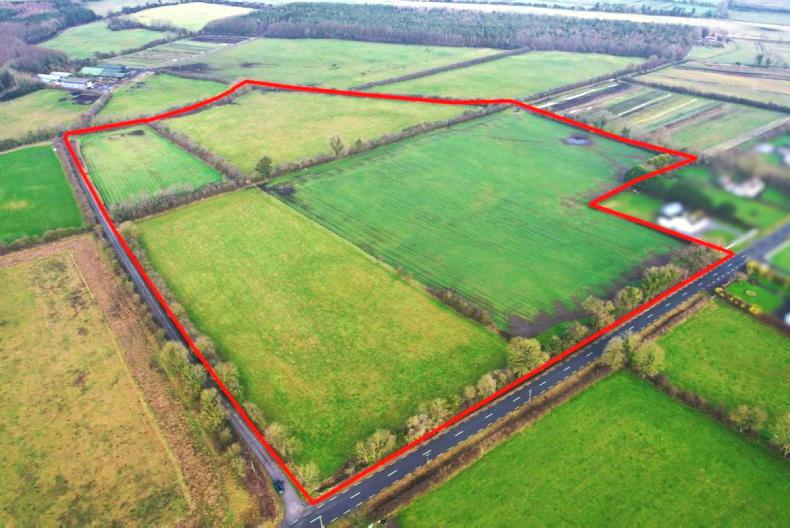
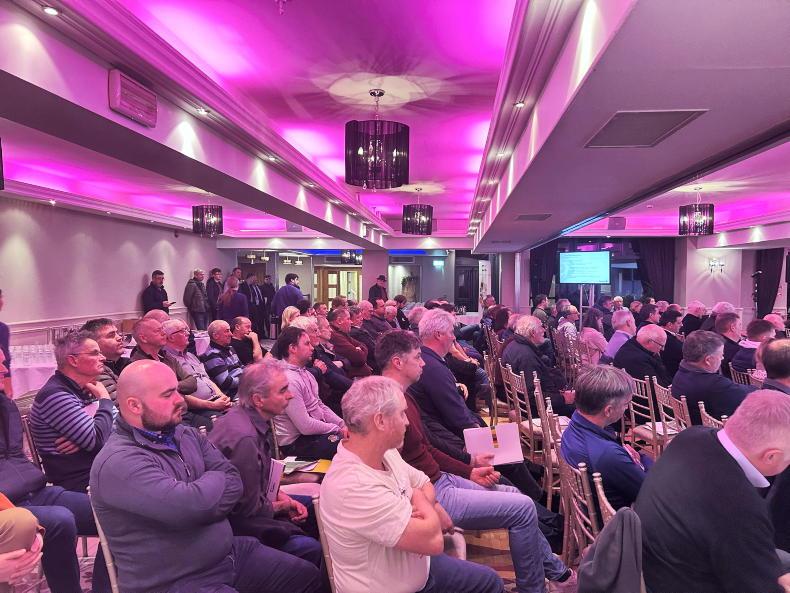
SHARING OPTIONS